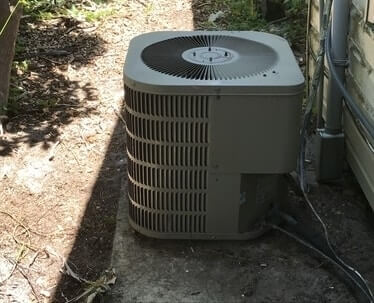Most Common AC Problems
 Air conditioning systems are complex appliances, so now and then something is bound to go wrong.
Air conditioning systems are complex appliances, so now and then something is bound to go wrong.
While some issues are minor and you can fix them yourself with a little DIY know how, significant issues can require an experienced technician to fix.
8 of the Most Common AC Problems
While there are many problems your air conditioning system could face, here are the most common:
1. Blowing Warm Air
An AC blowing warm air is an all too common problem. When your AC is blowing warm air, it’s frustrating. Especially in the summer months when temperatures are higher. Luckily, if your AC is blowing warm air, it could be an easy fix.
The first thing you should check is your AC’s air filter. If it’s dirty and clogged, you’ll want to replace your air filter, as it could be causing your system to blow warm air.
If it’s not the filter, you could have a stalled condenser coil, which is the part of the AC that produces cold air, or an issue with the air conditioner’s ductwork.
2. Making Strange Noises
It’s never a good sign if your AC is making a strange noise. Although most air conditioners make some noise when they’re running, if it’s making more noise than usual or vibrating, there could be an issue.
A common cause of weird AC noise is a problem with the air handler or a belt slip in the motor. If this is the case, it’s best to shut your AC off and call your HVAC local professionals for a proper diagnosis.
3. Leaking or Pooling Water
Water leaks are a common issue amongst air conditioning systems. Because they can lead to extensive home damage, it’s essential to act fast when your air conditioner is leaking water.
The best way to deal with water leaks is to stop them before they start, and the best way to do that is through preventive maintenance. You might not think it’s necessary, but it can save you time and money in the long run.
4. Refrigerant Leak
Refrigerant leaks are one of the most common AC problems and can be one of the most frustrating for homeowners when the problem is not appropriately fixed.
Low refrigerant levels are caused by an AC system being uncharged at installation or a refrigerant leak. Refrigerant is not depleted as part of a properly functioning AC system’s cooling process. This means that simply adding more refrigerant isn’t a long term solution since it will just leak out again.
Don’t waste money on a temporary fix to a permanent problem. Fixing the leaks or replacing the refrigerant coil are more expensive solutions, but they will save you money in the long run.
5. Clogged AC Drain Line
AC drain lines can become clogged from a buildup of algae or other debris, improperly placed piping, or even an insect building a nest inside.
If your AC drain line is clogged, the condensation that builds up in your AC system may pool inside the drip pan or leak out and cause water damage. If you notice a leak or water accumulating in the drip pan, you can try to perform some DIY AC maintenance and clean your AC drain line with vinegar.
6. AC Keeps Turning On and Off
If your AC keeps turning on and off, this could be a clogged AC drain or condensate line issue. If not maintained, the drain line or drain pipe can become clogged with dirt, mold, or other organic growth, causing the safety sensor to turn off the AC system so that it does not overflow the line and flood the surrounding areas.
Our complete guide to cleaning an AC drain line can help walk you through the steps to get it back in order.
7. Thermostat Not Working
A non-working or blank thermostat in your home or office is usually the road to frustration for many trying to find quick comfort.
First, be sure to set your thermostat to the correct mode: ON or AUTO.
Second, make sure the batteries in the thermostat are not dead and still efficiently power your device.
Lastly, be sure that your thermostat is not located near any sources of direct light or wind, like a lamp, computer, or direct line of a fan, which will alter its performance.
Troubleshooting common thermostat issues before calling an HVAC professional can help save you in the long run.
8. AC Won’t Turn On
Be sure to check your electrical breaker, which could have somehow tripped, turning off the system. Many sources of electrical devices connected to the same power source can cause this to happen. But a quick check and flip of the breaker switch will save the call to the heating and cooling professionals.
For more information, check out our article: How to Troubleshoot an AC That Won’t Turn On